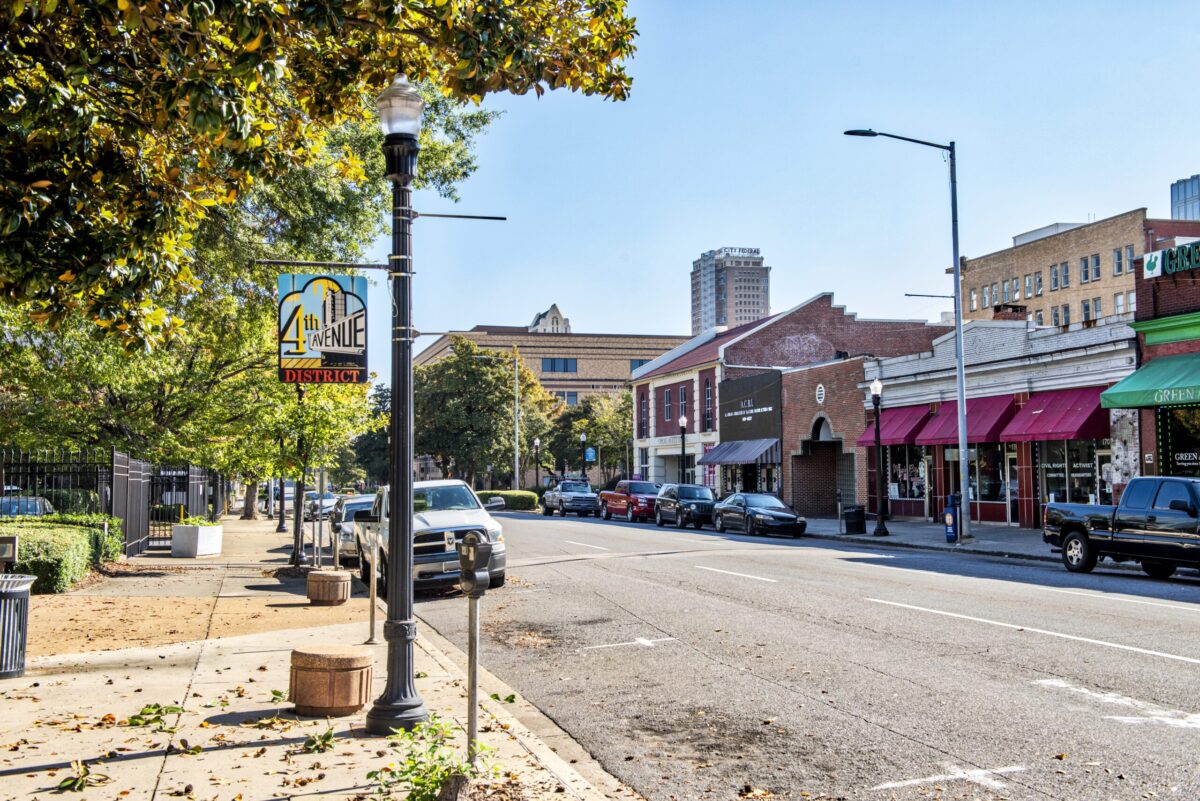
Sam Pugh and Isaiah Smith both grew up hearing about the importance of Birmingham’s Historic 4th Avenue Business District, one of the only surviving Black Business Districts in the Southeast still operating with a majority Black-owned business ecosystem and property ownership.
Pugh’s father worked at the Birmingham Civil Rights Institute. Smith grew up in Charlotte, North Carolina, but his family hails from the Magic City. So, they both were eager to seize the opportunity to work for Urban Impact, a nonprofit organization committed to growing traditionally underserved Black commercial districts and communities and removing barriers for Black entrepreneurs.
Pugh and Smith were recently hired as program associates for the organization. The Community Foundation of Greater Birmingham has awarded Urban Impact a $60,000 grant over three years to support the salary of this position.
“Originally envisioned as a ‘District Coordinator’ role, this position evolved through our national program participation with Mastercard Strive USA and Village Capital,” Ivan W. Holloway, executive director of Urban Impact, explained. “We realized the title didn’t fully reflect the level of program-centered support and connectivity we needed this position to carry. The reframe to ‘Program Associate’ was intentional. It better captures the hands-on, relational nature of the work and its deep integration with the entrepreneurial journeys we support.”
Missing Pieces of the Puzzle
As program associates, Pugh and Smith will work directly with business owners through initiatives like the BECOME business accelerator and other programs, while also collecting and studying data on the Fourth Avenue Business District as a whole.
“They are the missing pieces of the puzzle that we needed,” Courtney Craig, Urban Impact program manager, said of Pugh and Smith, noting how their educational backgrounds complement each other.

Pugh is a graduate of the University of Alabama at Birmingham where he studied political science and mass communications with a concentration in public relations. After college, he spent time in Washington, D.C., interning with Congresswoman Terri Sewell. Pugh feels all of this helped prepare him for his new role with Urban Impact.
“UAB gave me all the tools to learn how to do community engagement and community relations,” Pugh said. “Learning how to talk with people, learning how to impact the image of an organization, making sure that the public understands completely what we do, how we can serve them and how we can effect change has been really massive. I also got to learn from the Congressional Black Caucus Foundation when I was in D.C., being able to see advocacy in action and seeing individuals who are doing the work in their city.”
After his internship, Pugh considered staying in Washington, D.C.
“But I realized that I really cared about the City of Birmingham and the people here,” he said.
Smith graduated from Alabama A&M University, where he studied urban planning.
“Alabama A&M has the only undergraduate Urban Planning program in an HBCU in the nation,” Smith said. “And only 2% of certified urban planners are Black.”
Smith can apply the skills he’s learned in a nuanced way because he better understands the problems facing Birmingham’s Black business community.

“The spirit of entrepreneurship is strong here in Birmingham,” Smith said. “There’s a will for people to get out and build something from their own hands, but there hasn’t been the infrastructure in place for them to build their ideas out in a way that will be able to scale.”
Urban Impact hopes to change this by not only giving entrepreneurs the tools they need to develop into savvy businessowners but also by uplifting the district that these businesses call home.
The Crown Jewel
Craig stressed that elevating Birmingham’s Historic 4th Avenue Business District can have a positive impact on the entire city.
“Black businesses are the number one employers of their community, so there’s an impact on economic growth when it comes to job creation and job sustainability,” she said. “And it creates more tax revenue for the city itself.”
Smith believes Birmingham’s Historic 4th Avenue Business District should be a shining example for both Birmingham residents and those visiting the Magic City.
“The 4th Avenue Black Business District is the crown jewel of what Black entrepreneurship looks like in the whole Birmingham metro area,” he said. When tourists come to Birmingham and walk through the Birmingham Civil Rights Institute and Kelly Ingram Park, they get a glimpse of what Black Birminghamians endured in their fight for equality and freedom.
Birmingham’s Black business district, Smith said, “needs to look like we’ve been triumphant.”
During the first half of the 20th century the district was filled with flourishing businesses, many of which later shuttered or relocated. Pugh is honored to be a part of an organization working to restore the area’s vibrancy.
“We are trying to see this area go back to what it was in its glory days,” Pugh said, “with folks out here all the time, feeling that this is a safe space for them to come shop, enjoy themselves and be a part. I’m excited to see the future of the district.”